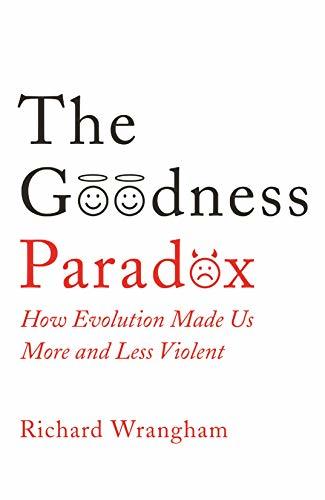What do you think?
Rate this book


'A fascinating new analysis of human violence, filled with fresh ideas and gripping evidence from our primate cousins, historical forebears, and contemporary neighbors' -- Steven Pinker
'A brilliant analysis of the role of aggression in our evolutionary history' -- Jane Goodall
It may not always seem so, but day-to-day interactions between individual humans are extraordinarily peaceful. That is not to say that we are perfect, just far less violent than most animals, especially our closest relatives, the chimpanzee and their legendarily docile cousins, the Bonobo. Perhaps surprisingly, we rape, maim, and kill many fewer of our neighbours than all other primates and almost all undomesticated animals. But there is one form of violence that humans exceed all other animals in by several degrees: organized proactive violence against other groups of humans. It seems, we are the only animal that goes to war.
In the Goodness Paradox, Richard Wrangham wrestles with this paradox at the heart of human behaviour. Drawing on new research by geneticists, neuroscientists, primatologists, and archaeologists, he shows that what domesticated our species was nothing less than the invention of capital punishment which eliminated the least cooperative and most aggressive among us. But that development is exactly what laid the groundwork for the worst of our atrocities.
401 pages, Kindle Edition
First published January 17, 2019
The revolution that first brought down the alpha bullies...had given the new leaders extraordinary power. By discovering that they could control even the most imposing fighter, the previously subordinate males found they could further their goals in other ways, too.... Some 300,000 years ago, males discovered absolute power. They had surely been individually dominant to females before the onset of capital punishment.... Afterward, however, the dominance of males...took a new form. It became a patriarchy in the special sense of male dominance based on a system. The system was a network of mature males protecting their mutual interests. (p. 215)
[T]he new mentality of which humanity is rightly proud had darker origins than we normally like to think. The force that bred conscience and condemnation into our ancestors began in the revolution of males competing for a new kind of power. It ended in the tyranny of the cousins with two major kinds of social effect.... It constrains society to follow moral principles that promote cooperation, fairness, and protection from harm....
[I]t also brought a new kind of dominance, because the limited power of a single alpha became the absolute power of a male coalition. (p. 221)
Coalitionary proactive aggression is responsible for execution, war, massacre, slavery, hazing, ritual sacrifice, torture, lynchings, gang wars, political purges, and similar abuses of power. It permits sovereignty as a right over life, caste as a system of casual domination, and guards who make prisoners dig their own graves. It makes kings out of wimps, underlies fidelity to groups, and gives us long-term tyrannies. It has battered our species since the Pleistocene....
It is therefore cheering to remember that in sane individuals proactive aggression is a highly selective behavior that is delicately attuned to context.... Proactive aggression is not produced by individuals in a fit of rage, or in an alcoholic haze, or out of a testosterone-induced failure of cortical control. It is a considered act by an individual or coalition that takes into account the likely costs. It has a strong tendency to disappear when it does not pay. (p. 246)